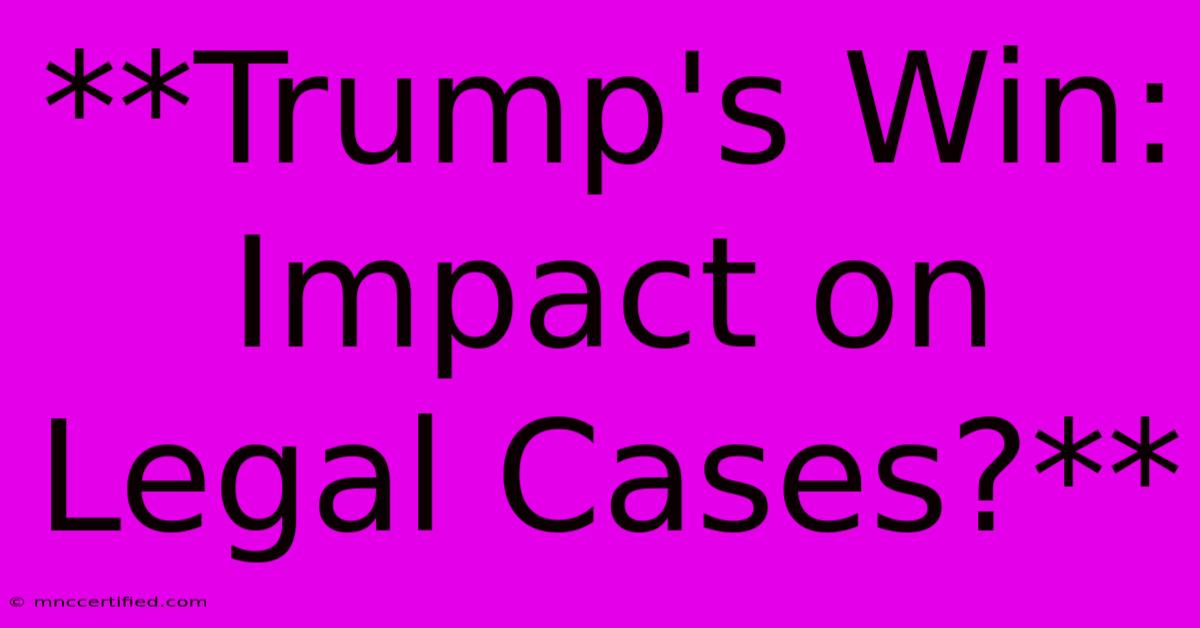**Trump's Win: Impact On Legal Cases?**

Table of Contents
Trump's Win: Impact on Legal Cases?
The 2024 Republican primaries are heating up, with former President Donald Trump currently leading the pack. As the race progresses, it's natural to wonder about the potential impact of a Trump victory on various legal cases currently pending or potentially looming. This question has sparked heated discussions, fueled by the unique nature of Trump's legal landscape.
The Potential Impact on Ongoing Cases
Several ongoing legal battles could be significantly affected by a Trump victory.
1. The January 6th Committee Report: The House Select Committee investigating the January 6th Capitol riot issued a comprehensive report, recommending criminal charges against Trump for inciting an insurrection. A Trump presidency could potentially lead to a pardon for himself or others involved in the riot, effectively nullifying the committee's findings and recommendations.
2. The New York Attorney General's Investigation: Trump is facing a civil lawsuit from the New York Attorney General, accusing him and his business of engaging in fraudulent business practices. A Trump victory could potentially influence the outcome of this case, potentially leading to a dismissal or a more favorable settlement for Trump.
3. The Georgia Election Interference Probe: Trump is under investigation in Georgia for potentially interfering with the 2020 presidential election. This case, if pursued, could lead to criminal charges against Trump. A Trump presidency could influence the investigation and potentially lead to its termination or a more lenient outcome.
4. The Classified Documents Case: Trump is facing a federal investigation regarding the handling of classified documents after leaving office. This case could potentially lead to criminal charges, and a Trump presidency could potentially influence the investigation's direction and outcome.
The Potential Impact on Future Legal Cases
Trump's potential presidency could also impact future legal cases, both civil and criminal, in several ways:
1. Presidential Immunity: As president, Trump would enjoy significant legal immunity, potentially shielding him from certain legal proceedings.
2. Executive Branch Influence: A Trump presidency could lead to increased pressure on federal agencies to investigate or prosecute Trump's political opponents. This could create a climate of political retribution and erode public confidence in the justice system.
3. Potential Pardons: A Trump presidency could lead to a wave of pardons for individuals convicted of crimes related to Trump's political activities or those associated with him. This could further erode public trust in the legal system and potentially undermine the rule of law.
4. Legislative Action: A Trump presidency could lead to legislative action aimed at influencing legal proceedings. This could include efforts to weaken existing laws, create new exceptions, or influence the composition of federal courts.
Key Considerations
The potential impact of a Trump presidency on legal cases is a complex issue with far-reaching implications. It's essential to consider the following factors:
- Separation of Powers: The legal system is designed to be independent of the executive branch. While a president can influence the justice system in various ways, it's crucial to recognize the separation of powers and the need for independent judicial processes.
- Public Trust: The legitimacy of the legal system relies on public trust. Any actions by a president that appear to undermine this trust could have detrimental long-term consequences for the rule of law.
- Accountability: Even with presidential immunity, a president is ultimately accountable to the people through the electoral process. The potential impact of a Trump presidency on legal cases should be evaluated within this broader context of accountability.
In Conclusion: The potential impact of a Trump presidency on legal cases is a subject of intense debate and speculation. The specific outcomes will depend on the interplay of legal processes, political realities, and public opinion. Ultimately, the legal system must remain independent and accountable, ensuring a fair and just outcome for all parties involved.

Thank you for visiting our website wich cover about **Trump's Win: Impact On Legal Cases?**. We hope the information provided has been useful to you. Feel free to contact us if you have any questions or need further assistance. See you next time and dont miss to bookmark.
Featured Posts
-
Empowering The Investment Foundation Grant
Nov 07, 2024
-
Trump Victory Boosts Dogecoin Prices
Nov 07, 2024
-
Katy Perry Announces Uk Headline Show After 6 Years
Nov 07, 2024
-
Small Business Health Insurance Des Moines
Nov 07, 2024
-
Insurance Defense Attorney Job Description
Nov 07, 2024